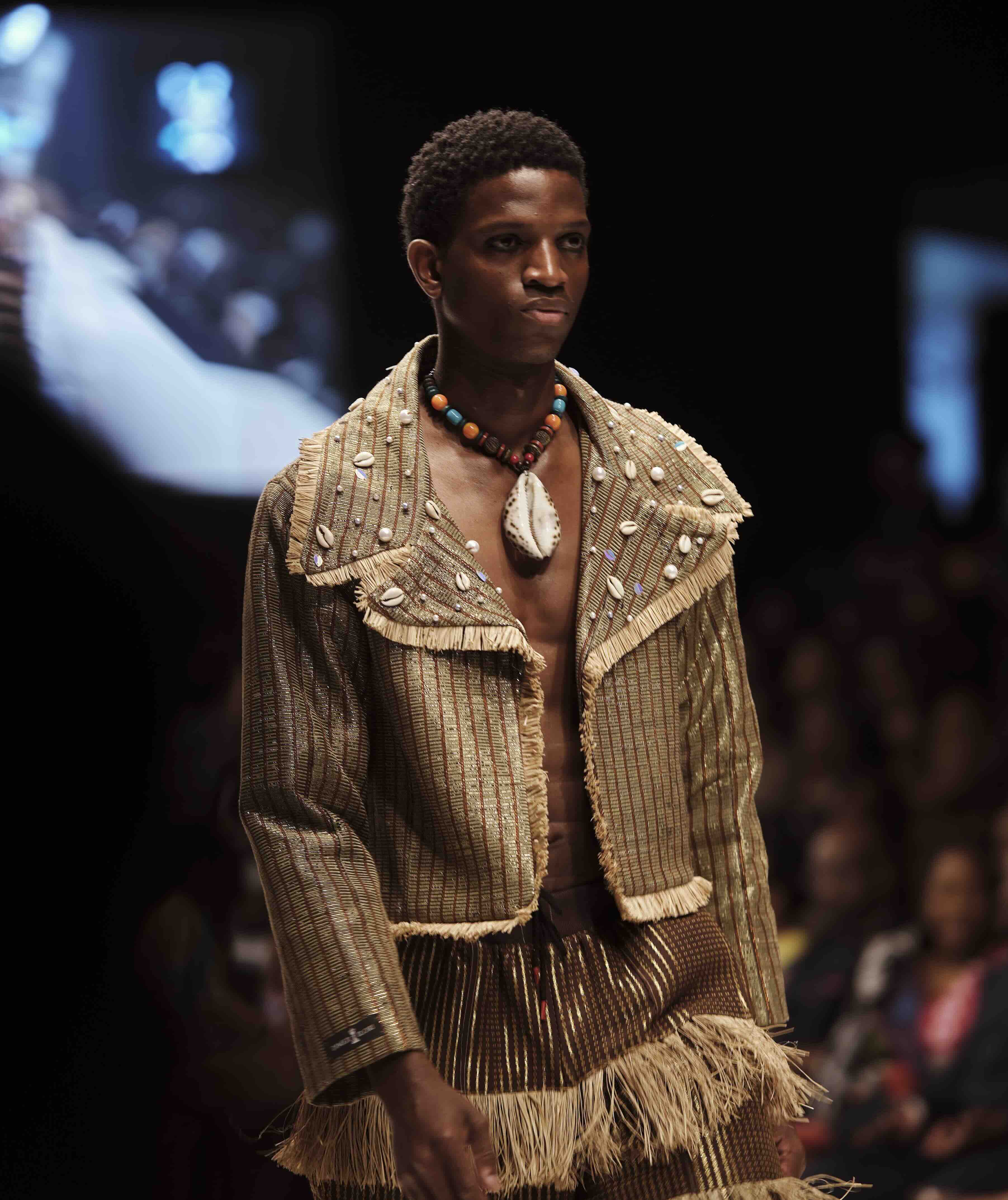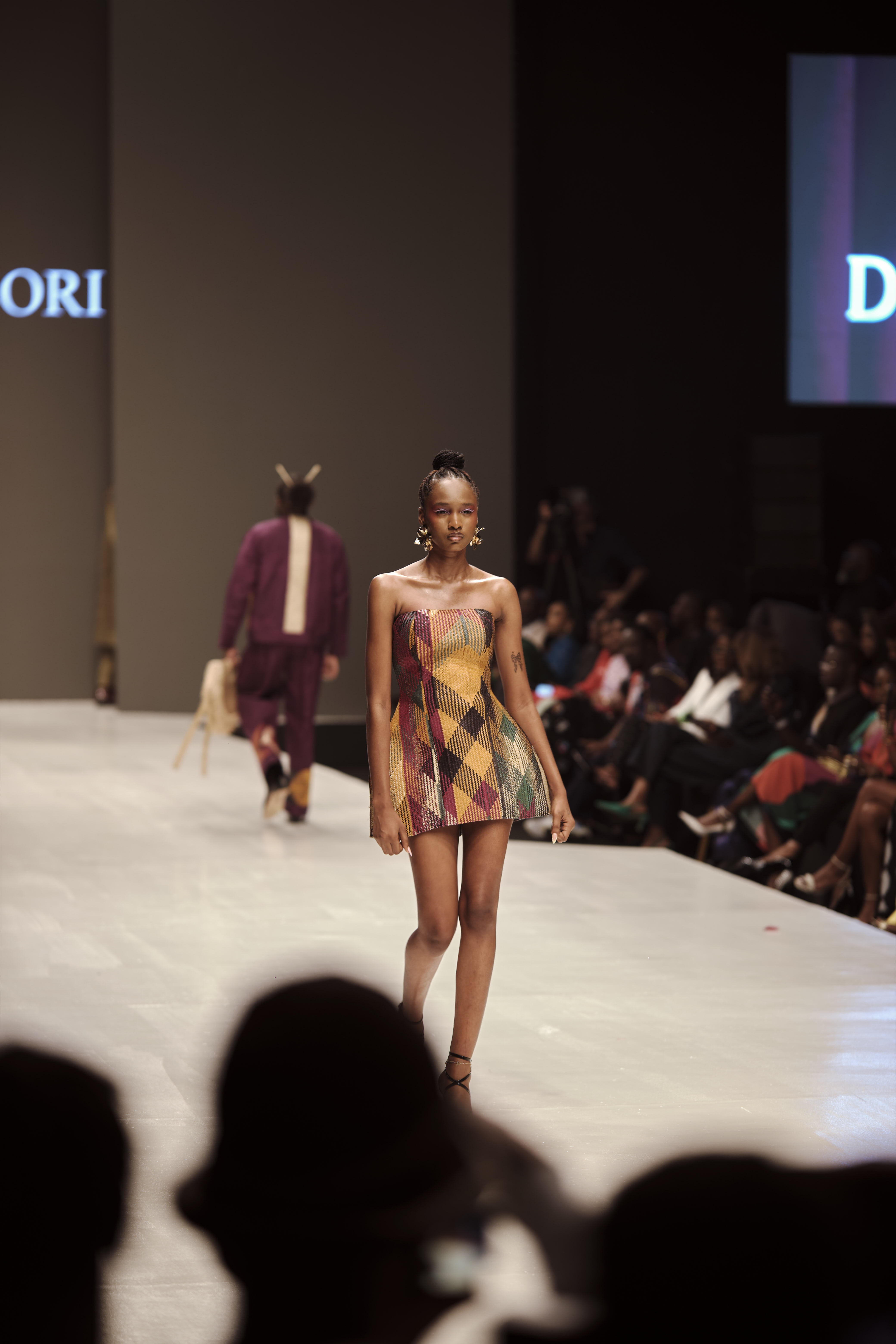
Yet again, Lagos Fashion Week proves why it stands at the forefront of Africa’s creative revolution.
Yet again, Lagos Fashion Week proves why it stands at the forefront of Africa’s creative revolution.
As the year draws to a close, cities around the world roll out their end-of-year events—and Lagos is no exception. Every December, Nigeria’s commercial capital transforms into a vibrant hub for people looking to unwind, connect, and create. This season, known locally as Detty December, is synonymous with carefree fun. While recent debates around the term’s trademark have sparked conversation in the creative space, they haven’t slowed the city’s annual events. One event that continues to define Lagos’ creative pulse is the prestigious Lagos Fashion Week.
The event, held in Lagos from October 29 to November 2, was a magnificent showcase of Africa’s vibrant and diverse fashion scene. From the fashion enthusiasts who dazzled on the red carpet with pristine, elegant outfits to the fashion houses and designers who transformed the runway into their own worlds—and the thrilling music performances and celebrity runway appearances by Ciara, Minz, Taves, Angel Anosike, and many others—this year’s fashion week truly upheld the legacy that has been carefully built over the years. Now in its 15th year, the program was founded by Omoyemi Akerele, a visionary who, alongside her team, has created a platform for over 60 designers across the continent to share their work with Africa and the world.

From an outsider’s perspective, it’s easy to admire the show’s success without considering the challenges behind the scenes. But as Akerele revealed in an interview with British Vogue, Lagos’ notorious traffic jams and unstable power supply posed serious threats to the show’s debut. Thanks to a dedicated team—including designers like Lisa Folawiyo and Maki Oh—the first edition triumphed, laying a strong foundation for future events. Reflecting on the show’s growth, Akerele noted, “We’re no longer just participating in global conversations; we’re shaping them.”
Due to Akerele’s dedication to shaping global conversations about fashion, many African designers — including Maxhosa, Kenneth Ize, Studio 189, Bubu Ogisi, Adebayo Oke-Lawal, and other creatives from Ghana, Côte d’Ivoire, South Africa, and Senegal — have gained platforms to showcase their designs, capture international attention, and ignite a fashion revolution.
In a conversation with British Vogue about the impact of Lagos Fashion Week on her journey, IAMISIGO’s founder, Bubu Ogisi, said, “It provided a crucial platform for dialogue, connecting us with key textile researchers, mentors, and the international fashion community.” Over the years, Ogisi’s brand has collaborated with Victoria’s Secret and showcased on the Copenhagen Fashion Week runway for Spring/Summer 2026 as the recipient of the Zalando Visionary Award. For Orange Culture’s Adebayo Oke-Lawal, Lagos Fashion Week was instrumental in sparking important conversations around gender fluidity, vulnerability, and masculinity.
Beyond putting African designers on the global fashion map, Lagos Fashion Week has become a strong advocate for sustainability within the continent’s fashion industry. Research shows that fashion is the world’s second-largest polluter after oil. Combined with labor exploitation in low-income countries, the industry’s environmental toll is staggering—making the call for sustainable fashion more urgent than ever, especially in Nigeria, where enforcement remains weak.
This is why Lagos Fashion Week’s consistent push for sustainability across its showcases is both impressive and vital. It demonstrates that Africa’s fashion industry is aligned with the global mission toward responsible production — a stance that continues to open doors for greater recognition and collaboration. That recognition is already unfolding, with Lagos Fashion Week named a finalist for the 2025 Earthshot Prize — Prince William’s €50 million initiative to champion eco-innovators.
Aside from its impact on the African fashion scene, Lagos Fashion Week also plays a vital role in boosting the city’s economy. From hotel bookings and travel to logistics and event hires, the influx of activities during the event puts more money in circulation. The fashion week also promotes local manufacturing. In preparation for the event, artisans such as tailors, bead workers, tie-dye artisans, stylists, set designers, and photographers are hired—creating job opportunities and contributing significantly to the economy.
Moreover, Lagos Fashion Week shines a global spotlight on Nigeria and Africa, as every piece showcased is sourced locally and every designer has Nigerian or African roots. This reinforces the “Made in Africa by Africans” narrative while opening doors to export opportunities, international collaborations, and expansion into global markets.

It is evident that Lagos Fashion Week continues to play an important role in the growth and global recognition of African fashion, as seen in the recently concluded edition. While reflecting on the show’s excellence and impact, it is equally important to spotlight the designers who brought their creativity to the runway this year.
Fashion brands like Hertunba, Emmy Kasbit, Ndiichie, Oshobor, and Dimeji Ilori captivated the audience with intricate pieces that beautifully merged Nigeria’s rich traditional heritage with contemporary design. Each collection thoughtfully incorporated cultural elements such as coral beads and raffia mats, reimagined into outfits that could effortlessly fit into modern wardrobes.
The sculptural details seen in several pieces also stood out as one of the show’s defining highlights. For instance, Sevon Dejana’s Transcendence collection was a masterclass in opulence and bold sculptural artistry. Each design in the collection drew inspiration from royalty, with many referencing the grandeur of medieval monarchs.
Other brands like Pepper Row and Garbe also made strong fashion statements on the runway. Garbe’s “Adepeju” collection infused politics and paid homage to Lagos in the ’90s and early 2000s. One standout piece was a plain white T-shirt featuring the face of former Nigerian ruler Sani Abacha, framed by the word “Wahala.” Pepper Row, on the other hand, explored the lives of women who command the ocean in their latest collection, “Sacred Lives of Fishermen’s Wives.” Each piece reflected the brand’s signature fun, light, and expressive approach to fashion — a reminder that tradition-inspired fashion can also be playful and modern.
With the “Neuro Knit” collection, LFJ delivered structured silhouettes and a burst of color. Every piece stood out for its meticulous detailing — from the feathered headpieces and sculptural eyewear to the oceanic tones that tied the collection together. Streetwear fashion also took center stage, as Ireti Zaccheus and TeeZee brought Street Souk to the runway. Known for its edgy, youthful aesthetic, Street Souk showcased the vibrancy of Nigeria’s street culture and represented a new wave of streetwear brands across the country.
It’s important to note that the runway wasn’t the only place where exceptional fashion pieces were showcased. Invited guests also took over the red carpet in stunning outfits. The red carpet delivered several standout fashion moments throughout the show, further proving that Nigeria is truly one of West Africa’s leading fashion hubs.
While fashion brands showcasing their collections on the runway was a major highlight of the fashion week, other activities added depth to the experience. One of these was the Fashion Business Series, which featured sessions like “Global Threads: The Business of Building Global Fashion Brands”—a platform for important conversations about the business side of fashion. Music also played a vital role throughout the event, setting the tone for the runway shows and helping to interpret the deeper messages behind some of the collections. The popular music group, Loud Urban Choir, delivered a captivating medley performance on the runway.
Yet again, Lagos Fashion Week proves why it stands at the forefront of Africa’s creative revolution. Every designer who showcased their collection on the runway has helped usher in a new chapter for African fashion. There’s no doubt that many of these pieces will soon grace global runways and red carpets. This year’s edition was a resounding success—another stride toward shaping the future of African fashion.
Comments